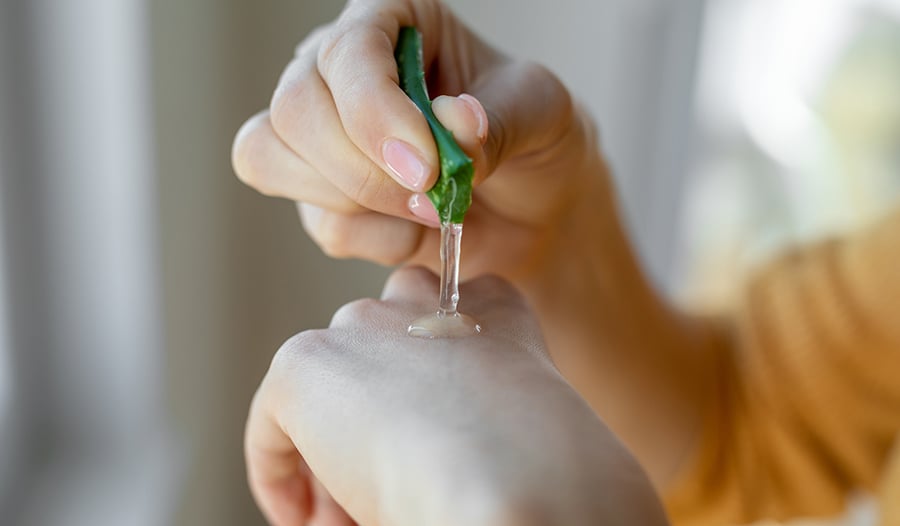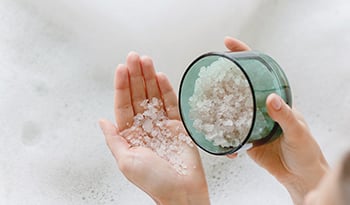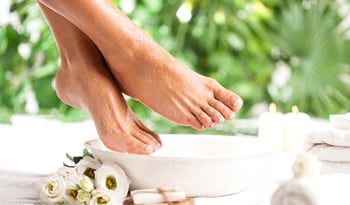5 Uses for Aloe Vera
DISCLAIMER:This blog does not intend to provide diagnosis...
- In this article:
- What Is Aloe Vera?
- Origin & History of Aloe Vera
- Medicinal Aloe Vera Uses
- Skincare Benefits of Aloe Vera
- How to Use Aloe Vera
- Common Side Effects & Health Risks of Aloe Vera
- Takeaway

What Is Aloe Vera?
Aloe vera is a succulent plant grown in hot, dry climates with a wide range of uses. Its sticky, thick gel provides many benefits when used topically or orally. While you may be most familiar with its ability to alleviate sunburn discomfort, its benefits go far beyond the beach. Aloe plants are easy to grow at home, but you can find packaged versions of aloe vera in gels, lotions, and supplements.
Origin & History of Aloe Vera
Aloe vera has been used and revered for its medicinal properties for over 2000 years.1 Egyptians referred to it as the “plant of immortality,” while Greek scientists considered it a cure-all for illness and disease.
The aloe vera plant contains over 75 active components responsible for its broad-reaching benefits for the body. From anti-inflammatory effects to digestive support, cultures worldwide have used aloe vera in many applications for thousands of years.
Medicinal Aloe Vera Uses
While aloe may not be the panacea the Greeks touted, its health benefits span the body. Of the 75 active elements in aloe vera, several have antioxidant or antimicrobial properties. Alone, these two features may help improve a wide range of health concerns and lower risk of diseases like heart disease and diabetes.
Antioxidant and Antibacterial Properties
Aloe vera contains vitamins A, C, and E, all of which have antioxidant properties. Antioxidants neutralize unstable molecules in the body known as free radicals, preventing them from damaging healthy cells. By preventing this free radical damage, antioxidants support the immune system and may help reduce the risk of disease.2
In fact, one study found people with diabetes who took aloe vera gel powder for three months saw significant improvements in their blood glucose, cholesterol, and blood pressure levels .3
Another study examining aloe vera’s effect on gastroesophageal reflux disease (GERD) found that 10 milliliters of aloe vera syrup daily for four weeks helped significantly reduce GERD symptoms like heartburn, regurgitation, and belching.4
Natural Mouthwash
Oral health isn’t just important for healthy teeth—it can impact your overall well-being. Daily toothbrushing and mouthwash are two important ways to support oral health.
While many manufactured mouthwashes contain alcohol and other harsh ingredients with uncomfortable side effects, aloe vera is a gentle, effective mouthwash alternative. In fact, in one study, aloe vera mouthwash reduced plaque just as well as an antiseptic mouthwash used to kill and prevent the growth of bacteria in the mouth without the unpleasant side effects.5
While this research was conducted using 100% pure aloe vera juice, you can make your own aloe vera mouthwash at home. Combine ½ cup distilled water with 1 cup aloe vera juice, 2 tablespoons baking soda, 1 tablespoon witch hazel, and 20 drops of peppermint essential oil. Shake up your mixture, and you have several servings of aloe vera mouthwash!
Check out this blog post for other ways to improve your oral hygiene using natural alternatives.
Skincare Benefits of Aloe Vera
So, what is aloe vera good for? One of aloe vera’s most well-known and widely used applications is relief from sunburn. However, aloe vera benefits your skin in other ways, too. In fact, aloe vera’s unique antibacterial and anti-inflammatory features make it an effective acne treatment. And with its ability to soothe irritated skin, aloe vera is a useful component of any skincare routine.
Sunburn
Whether you have an aloe plant in your kitchen, ready to snap and squeeze after a day by the pool or an accidental cooking burn, or are more familiar with the bottled version of aloe vera, both may help alleviate the discomfort associated with a sunburn. While aloe can’t cure a sunburn, evidence suggests it can speed the healing of second and third-degree burns, including mild sunburn.6 There are many aloe vera gel benefits, but healing a sunburn is the most well-known one. Apply aloe gel straight from the plant or bottled gel or lotion directly to a mild burn to help cool and soothe the area.
Acne Treatment
Aloe vera, when applied topically, may also help with acne. This pesky skin condition has many origins, but evidence suggests the combination of acne cream and aloe vera gel is more effective at treating acne than acne cream alone.7 Aloe vera’s ability to improve inflammatory lesions may contribute to its effectiveness as an acne treatment. Further, its antimicrobial properties and ability to rupture the cell walls of bacteria may help make aloe effective against certain types of acne-causing bacteria.8
Soothing Skin Irritations
Though it can be difficult to pinpoint the exact cause of irritated, dry skin and eczema, aloe’s soothing qualities may help alleviate the discomfort from these conditions. Aloe vera’s ability to promote wound and burn healing and reduce inflammation and bacteria on the skin may benefit eczema.
Eczema is characterized by inflamed skin that can lead to dry, itchy, and scaly patches. While this can be uncomfortable on its own, these symptoms may also lead to more worrisome outcomes, like skin infections. Prescription and over-the-counter treatments are available for eczema, and there are plenty of natural remedies for alleviating its symptoms, too.
Aloe vera may not only be an effective, natural treatment for eczema in adults, it may also help soothe dry skin in babies. Homemade recipes that include oats and aloe vera may be even more effective due to oatmeal’s natural anti-inflammatory qualities.9
How to Use Aloe Vera
Whether you are seeking relief following a burn, trying to heal dry skin, or hoping to improve your acne, aloe vera can be a helpful treatment when applied directly to the skin. Aloe is a low-maintenance, easy-to-grow plant. Having one near a sunny window doesn’t just add natural beauty to your space. It allows you to snap off a frond and squeeze out the gel for immediate use whenever you need it. Aloe is also widely available in bottled gels and lotions.
When using aloe vera topically, simply apply a small amount of gel or lotion to the affected area.
In addition to topical use, ingesting aloe vera may offer additional benefits, including helping lower blood sugar levels and improving blood pressure and cholesterol levels in those with type 2 diabetes.10 As a source of antioxidants, aloe vera juice may also support skin health. And oral use of aloe vera as a mouthwash can improve tooth and gum health. To enjoy the benefits of aloe vera internally, try drinking the juice on its own or in a smoothie.
Common Side Effects & Health Risks of Aloe Vera
While aloe vera’s antioxidant and anti-inflammatory benefits are promising, it’s important to consider potential side effects before loading up on aloe products. Research suggests that ingestion of aloe vera may lead to diarrhea, stomach cramps, and vomiting.11 While not life-threatening in most cases, these symptoms can be uncomfortable and lead to more serious issues like dehydration.
Commercially prepared aloe vera products, like juices, gels, and lotions, may be safer than getting aloe directly from the whole plant. Even so, be sure to follow the manufacturer’s instructions and discontinue using the aloe product if side effects arise.
It is always a good idea to talk to your healthcare team before making any changes to your diet and supplements.
Takeaway
From burn healing to skin and oral health, there are many reasons to consider adding aloe vera to your wellness routine. While there is little risk of side effects when aloe vera is used according to the manufacturer’s guidelines, it’s always a good idea to be cautious when introducing a new supplement into your routine. Based on current data, aloe vera appears to be a promising solution for many common concerns, and future research may continue to document how aloe vera can benefit your health.
References:
- Surjushe A, Vasani R, Saple D. ALOE VERA: A SHORT REVIEW. Indian J Dermatol. 2008;53(4):163.
- Zehiroglu C, Ozturk Sarikaya SB. The importance of antioxidants and place in today’s scientific and technological studies. J Food Sci Technol. 2019;56(11):4757.
- Choudhary M, Kochhar A, Sangha J. Hypoglycemic and hypolipidemic effect of Aloe vera L. in non-insulin dependent diabetics. J Food Sci Technol. 2014;51(1):90.
- Panahi Y, Khedmat H, Valizadegan G, Mohtashami R, Sahebkar A. Efficacy and safety of Aloe vera syrup for the treatment of gastroesophageal reflux disease: a pilot randomized positive-controlled trial. Journal of Traditional Chinese Medicine. 2015;35(6):632-636.
- Gupta RK umar, Gupta D, Bhaskar DJ ohn, Yadav A, Obaid K, Mishra S. Preliminary Antiplaque Efficacy of Aloe Vera Mouthwash on 4 Day Plaque Re-Growth Model: Randomized Control Trial. Ethiop J Health Sci. 2014;24(2):139. doi:10.4314/EJHS.V24I2.6
- Levin NJ, Erben Y, Li Y, Brigham TJ, Bruce AJ. A Systematic Review and Meta-Analysis Comparing Burn Healing Outcomes Between Silver Sulfadiazine and Aloe vera. Cureus. 2022;14(10).
- Hajheydari Z, Saeedi M, Morteza-Semnani K, Soltani A. Effect of Aloe vera topical gel combined with tretinoin in treatment of mild and moderate acne vulgaris: a randomized, double-blind, prospective trial. J Dermatolog Treat. 2014;25(2):123-129.
- Rahmani AH, Aldebasi YH, Srikar S, Khan AA, Aly SM. Aloe vera: Potential candidate in health management via modulation of biological activities. Pharmacogn Rev. 2015;9(18):120.
- Reynertson KA, Garay M, Nebus J, et al. Anti-inflammatory activities of colloidal oatmeal (Avena sativa) contribute to the effectiveness of oats in treatment of itch associated with dry, irritated skin. J Drugs Dermatol. 2015;14(1):43-48.
- Foster M, Hunter D, Samman S. Evaluation of the Nutritional and Metabolic Effects of Aloe vera. Herbal Medicine: Biomolecular and Clinical Aspects: Second Edition. Published online March 28, 2011:37-54.
- Guo X, Mei N. Aloe vera: A review of toxicity and adverse clinical effects. J Environ Sci Health C Environ Carcinog Ecotoxicol Rev. 2016;34(2):77.

 By Melissa Rifkin, MS, RDN, CDN
By Melissa Rifkin, MS, RDN, CDN


